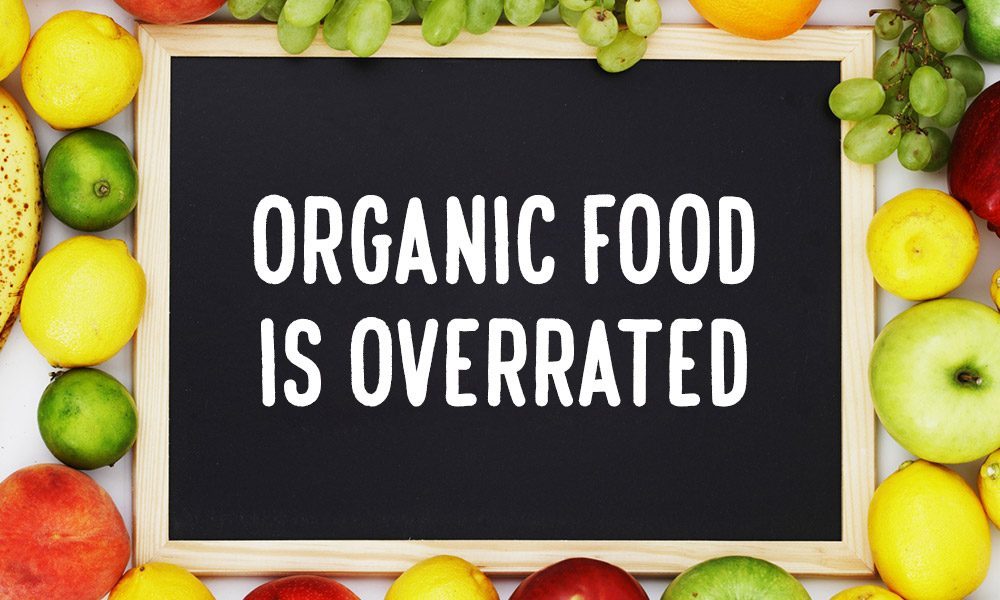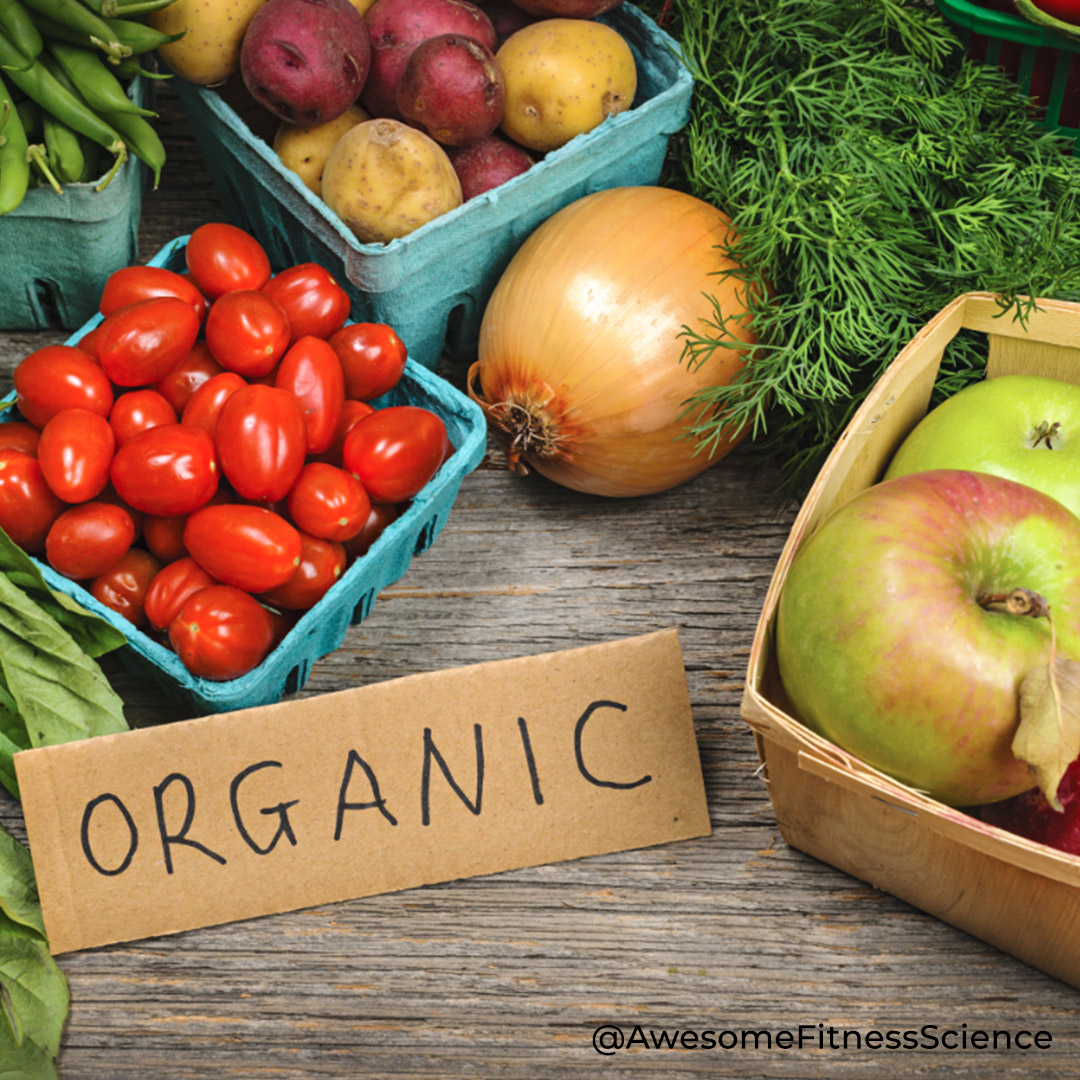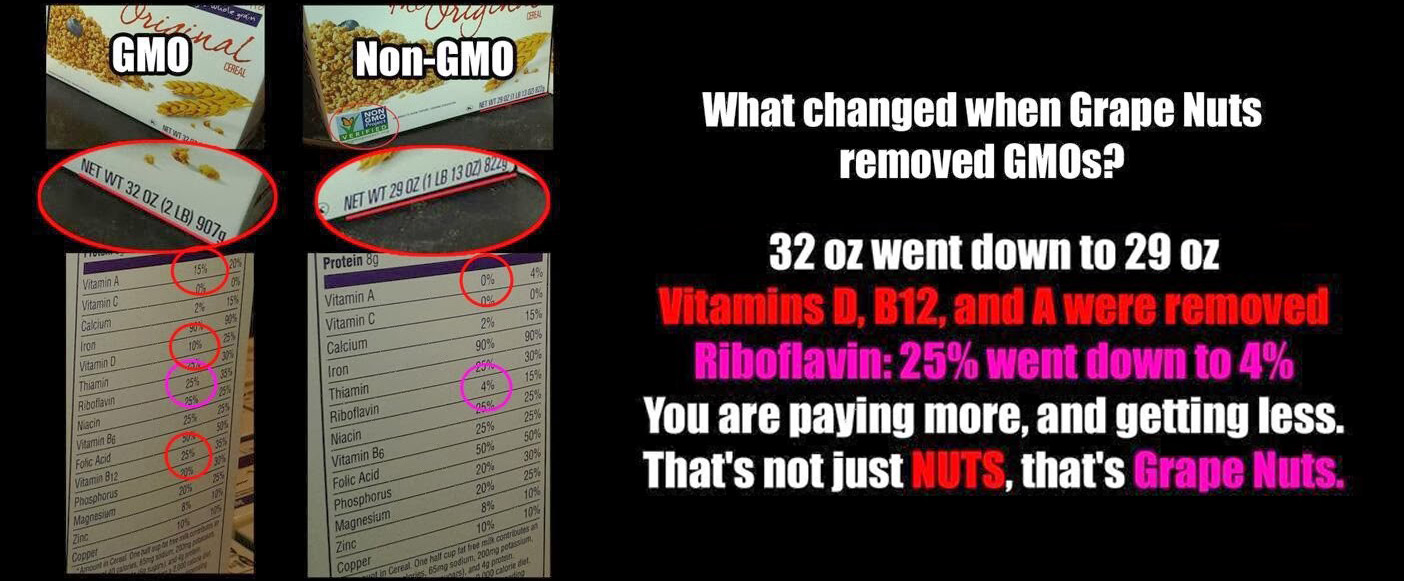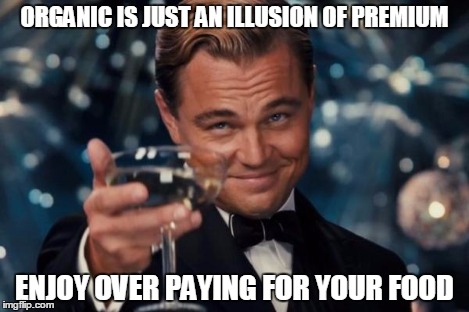
The Lifter’s Guide to Warming Up
The Lifter’s Guide to Warming Up Warming up is like saving for retirement. We all know it’s important, but we don’t exactly know why or

When somebody claims organic food to be better, that’s a good sign they are clueless about nutrition science.
I partially don’t blame many people. The nutrition industry is known for bamboozling you with fear-based marketing. They’ll make you fear words like synthetic and antibiotic, so you pay more for foods labeled organic and natural. You’re led to believe that if it costs more, it must be better.
Unfortunately, many organic diehards are often stubborn. It’s understandable. You’ve been investing endlessly in organic foods and you don’t want to be wrong now. That’s normal human ego and I can totally relate.
However, as much as I enjoy being right, I care more that you come to know the truth especially if it means saving you significant money for the remainder of your life. So while I might bruise your ego and smash your worldview of nutrition in this article, it’s for the better.
As a heads up, this topic particularly hits home for me. I work with many lower income clients who struggle with bills, care about their family’s health, and have often experienced shame for not eating organic. I’ve seen single moms feeling like they’re harming their child because they can’t afford organic groceries.
So I somewhat apologize in advance if my speech is too passionate, but at the same time, I don’t give a flying fairy. Let’s crush the false narrative of organic food marketing that reeks of elitist bs.
The term organic refers to how a food is produced. They have a stricter regulation which varies between countries. Generally speaking, organic foods don’t involve antibiotics, hormones, GMOs, or artificial/synthetic pesticides.
None of these things in conventional produce is inherently bad though. Yes, conventional groceries are just as safe despite what some hippie influencer says. Allow me to bust some myths.
The Environmental Protection Agency (EPA) defines pesticides as an “active ingredient” that prevents, destroys, repels, or mitigates a pest, or is a plant regulator, defoliant, desiccant, or nitrogen stabilizer (1)
Pesticides are necessary for farmers to grow produce safely, efficiently, and bring high quality produce to your table. They help kill harmful bacteria on plants. In fact, ask any farmer how dumb someone sounds when they talk poorly about pesticides. You might as well get the word “ignorant” tattooed across your forehead.
Furthermore, the word pesticide like the word chemical is misunderstood. It’s not bad. In fact, 99.99% of the pesticides you eat come from the plant themselves (2).
The average person eats 1.5 grams of natural pesticides which is 10,000 times more than the amount in synthetic pesticide residues.
Even when tested for the highest pesticide residue, you’d have to eat 453 strawberries, 850 apples, 3671 potatoes, 4723 peaches, or 18,611 servings of kale in one day to get a chance at having negative side effects from external pesticides (25).
I seriously wonder what people who test pesticides for a living think when dorks on the internet constantly say dumb stuff like pesticides aren’t tested.
The EPA have strict tests for pesticide tolerance (3). They run these test for months with a variety of doses assessing the risk of any human harm (4). One independent review found pesticides are highly effective and new pesticide compounds constantly go through substantial safety tests (5).

Organic foods have pesticide residues as well and in similar amounts as conventional foods (6). The EPA has a strenuous program to ensure the amounts that end up in your food is safe from both conventional and organic (7).
It’s all in a controlled manner and doesn’t impact human health. Added hormones allow cows to grow faster and provide more food to the masses. Certain antibiotics are approved by the FDA after many boards have tested them for appropriate use like disease control and disease prevention (8).
Organic food is free from GMOs (genetically modified organisms), so people automatically assume they’re what makes conventional foods bad for you especially because GMOs aren’t natural. What rubbish. Volcanic eruptions are natural, but they’re not exactly good for you. Modern medicine isn’t natural, but you should probably take it if you need to.
GMOs, partly due to not being natural get a massively bad rep. People will say, we just don’t know enough about them and that they’re dangerous, yet we have over 30 years of research saying otherwise (9). This is similar to the undeserved hate against artificial sweeteners.
If you’re a GMO opponent, I ask you, how much research is enough to reasonably rationalize with you? I can understand calling conspiracy theory if there are only a few groups doing studies and advocating for GMOs with conflict of interests, but this isn’t the case.
More than 280 science and technology societies from around the world concluded GMOs are safe (12,13). And over half of GMO research is independent (10,11).
Klumper et al did a meta-analysis of 147 studies finding genetically modified crops were safe, had fewer pesticides, and produced more food (14).
Domingo et al did multiple updated reviews in the last 2 decades finding GMOs are safe (15).
Pellegrino et al reviewed over 6000 studies finding genetically modified crops have reduced levels of toxins and higher grain quality (16).
All animal research finds them to be safe as well and have no adverse effect on any fertility marker (17,18).
So would you rather believe the above evidence about GMOs or Karen on Facebook who swears GMOs will mutate your cells into cancer?

A large part why organic isn’t better for the environment is it’s restrictions on genetic manipulation.
In 2016, genetically modified farming reduced greenhouse gas emissions by 64.9 million pounds of atmospheric metrics which is equal to removing 16.7 million cars (19).
Genetically modified farming reduces farming costs and increases crop yields while being better for the environment in a way organic farming can’t (20,21). Conventional cow farming also have reduced greenhouse gas emissions (22).
Organic farming uses 40% more land and provide 45% less meat (23,24). This disparity will continue to grow as genetic engineering gets more advanced in conventional farming while organic farming is still restricting that.
Research finds people think organic foods have fewer calories despite organic and conventional foods having the same amount (26).
Every review (big study of studies) finds organic is no healthier than conventional with no measurable health benefits (27-30). We’re talking hundreds upon hundreds of studies showing conventional is just as healthy and safe.
Every micronutrient is nearly the same with no discernable differences in health outcomes (31,32,33).

Buying local regardless of conventional or organic, can be beneficial in theory, but I’m honestly not sure if it means anything.
The theory is that as produce travels to your dinner table, they lose nutrients. This theory is repeated endlessly on the internet and based on one 2008 study (33). This is the only study ever referenced on articles promoting local produce and nearly every other article I looked at didn’t reference a single study.
The 2008 study found seasonally grown broccoli had a tiny bit more vitamin C in them. It wasn’t meaningfully different and people eating broccoli are likely already getting sufficient vitamin C especially if there’s even just 1 other vitamin C source in their diet. Getting more vitamin C beyond being deficient doesn’t improve any health outcomes either.
Furthermore, frozen and fresh produce have similar nutrient profiles (34). The theory that plants lose nutrients as they take longer to arrive at your dinner table isn’t relevant to any practical degree. Buying local is something I really do wish had meaningful nutritional benefit, but after searching endlessly for data to support this, it doesn’t exist. I simply couldn’t draw this conclusion.
Ultimately, be careful thinking that more expensive groceries are better for you. Organic foods have tons of misconceptions around it. It’s garnered quite the elitist type aura making people think it’s better.
However, the facts show organic foods aren’t safer, healthier, or better for the environment than conventional. The only difference is that organic food will shave more money off your paycheck.
I mean, just try making a family sized bowl of guacamole with organic avocados. You’ll burn through half your salary making such dishes. You could’ve made the same bowl of guacamole with conventional produce and had money left over for a nice cardigan.
So stop fearing conventional foods. Choose facts over fear.
1. EPA, Environmental Protection Agency, https://www.epa.gov/ingredients-used-pesticide-products/basic-information-about-pesticide-ingredients.
2. Ames, B N, et al. “Dietary Pesticides (99.99% All Natural).” Proceedings of the National Academy of Sciences of the United States of America, U.S. National Library of Medicine, Oct. 1990, https://www.ncbi.nlm.nih.gov/pmc/articles/PMC54831/.
3. EPA, Environmental Protection Agency, https://www.epa.gov/pesticide-tolerances/about-pesticide-tolerances.
4. EPA, Environmental Protection Agency, https://www.epa.gov/pesticide-registration/data-requirements-pesticide-registration.
5. Reeves, William R, et al. “Assessing the Safety of Pesticides in Food: How Current Regulations Protect Human Health.” OUP Academic, Oxford University Press, 21 Jan. 2019, https://academic.oup.com/advances/article/10/1/80/5298226.
6. “Pesticides and Food: It’s Not a Black or White Issue – Part 4: How Do Organic Pesticides Compare to Synthetic Pesticides?” Genetic Literacy Project, 12 Apr. 2021, https://geneticliteracyproject.org/2021/04/08/pesticides-and-food-its-not-a-black-or-white-issue-part-4-how-do-organic-pesticides-compare-to-synthetic-pesticides/.
7. “Pesticide Data Program.” Pesticide Data Program | Agricultural Marketing Service, https://www.ams.usda.gov/datasets/pdp.
8. “Where Resistance Spreads: Food Supply.” Centers for Disease Control and Prevention, Centers for Disease Control and Prevention, 22 Nov. 2021, https://www.cdc.gov/drugresistance/food.html.
9. Sciences, National Academies of, et al. “Human Health Effects of Genetically Engineered Crops.” Genetically Engineered Crops: Experiences and Prospects., U.S. National Library of Medicine, 17 May 2016, https://www.ncbi.nlm.nih.gov/books/NBK424534/.
10. Mogel, Karl Haro von. “Announcing the Launch of the Genera Beta Test.” Biology Fortified Inc., 25 Aug. 2014, https://biofortified.org/2014/08/announcing-the-launch-of-the-genera-beta-test/.
11. MA;, Sanchez. “Conflict of Interests and Evidence Base for GM Crops Food/Feed Safety Research.” Nature Biotechnology, U.S. National Library of Medicine, https://pubmed.ncbi.nlm.nih.gov/25658276/.
12. “More than 280 Scientific and Technical Institutions Support the Safety of GM Crops.” S Quiero Transgnicos, http://www.siquierotransgenicos.cl/2015/06/13/more-than-240-organizations-and-scientific-institutions-support-the-safety-of-gm-crops/.
13. “The International Scientific Consensus on Genetically Engineered Food Safety.” The Credible Hulk, 9 July 2018, https://www.crediblehulk.org/index.php/2015/11/22/the-international-scientific-consensus-on-genetically-engineered-food-safety/.
14. Klümper, Wilhelm, and Matin Qaim. “A Meta-Analysis of the Impacts of Genetically Modified Crops.” PLOS ONE, Public Library of Science, https://journals.plos.org/plosone/article?id=10.1371%2Fjournal.pone.0111629.
15. JL;, Domingo. “Safety Assessment of GM Plants: An Updated Review of the Scientific Literature.” Food and Chemical Toxicology : an International Journal Published for the British Industrial Biological Research Association, U.S. National Library of Medicine, https://pubmed.ncbi.nlm.nih.gov/27317828/.
16. Pellegrino, Elisa, et al. “Impact of Genetically Engineered Maize on Agronomic, Environmental and Toxicological Traits: A Meta-Analysis of 21 Years of Field Data.” Nature News, Nature Publishing Group, 15 Feb. 2018, https://www.nature.com/articles/s41598-018-21284-2.
17. Snell. “Assessment of the Health Impact of GM Plant Diets in Long-Term and Multigenerational Animal Feeding Trials: A Literature Review.” Food and Chemical Toxicology : an International Journal Published for the British Industrial Biological Research Association, U.S. National Library of Medicine, https://pubmed.ncbi.nlm.nih.gov/22155268/.
18. Keshani, Parisa, et al. “The Effect of Genetically Modified Food on Infertility Indices: A Systematic Review Study.” TheScientificWorldJournal, Hindawi, 13 Aug. 2020, https://www.ncbi.nlm.nih.gov/pmc/articles/PMC7443040/.
19. authors, All, and Graham Brookes & Peter Barfoot. “Environmental Impacts of Genetically Modified (GM) Crop Use 1996-2016: Impacts on Pesticide Use and Carbon Emissions.” Taylor & Francis, https://www.tandfonline.com/doi/full/10.1080/21645698.2018.1476792.
20. Searchinger, Timothy D., et al. “Assessing the Efficiency of Changes in Land Use for Mitigating Climate Change.” Nature News, Nature Publishing Group, 12 Dec. 2018, https://www.nature.com/articles/s41586-018-0757-z.
21. LP;, Gianessi. “Economic and Herbicide Use Impacts of Glyphosate-Resistant Crops.” Pest Management Science, U.S. National Library of Medicine, https://pubmed.ncbi.nlm.nih.gov/15706602/.
22. Basarab, John, et al. “Greenhouse Gas Emissions from Calf- and Yearling-Fed Beef Production Systems, with and without the Use of Growth Promotants.” Animals : an Open Access Journal from MDPI, MDPI, 16 Apr. 2012, https://www.ncbi.nlm.nih.gov/pmc/articles/PMC4494322/.
23. Treu, Hanna, et al. “Carbon Footprints and Land Use of Conventional and Organic Diets in Germany.” Journal of Cleaner Production, Elsevier, 10 May 2017, https://www.sciencedirect.com/science/article/abs/pii/S0959652617309666.
24. “Organic Farming Is Bad for the Environment.” NeuroLogica Blog, 25 May 2017, https://theness.com/neurologicablog/index.php/organic-farming-is-bad-for-the-environment/.
25. Safefruitsandveggies.com, https://www.safefruitsandveggies.com/.
26. The “Organic” Path to Obesity? Organic Claims Influence … https://www.researchgate.net/publication/46525637_The_organic”_path_to_obesity_Organic_claims_influence_calorie_judgments_and_exercise_recommendations.
27. Dangour, Alan D, et al. “Nutritional Quality of Organic Foods: A Systematic Review.” OUP Academic, Oxford University Press, 29 July 2009, https://academic.oup.com/ajcn/article/90/3/680/4597089.
28. Dangour. “Nutrition-Related Health Effects of Organic Foods: A Systematic Review.” The American Journal of Clinical Nutrition, U.S. National Library of Medicine, https://pubmed.ncbi.nlm.nih.gov/20463045/.
29. Smith-Spangler . “Are Organic Foods Safer or Healthier than Conventional Alternatives?: A Systematic Review.” Annals of Internal Medicine, U.S. National Library of Medicine, https://pubmed.ncbi.nlm.nih.gov/22944875/.
30. Nutrients | Free Full-Text | A Systematic Review of … – MDPI. https://www.mdpi.com/2072-6643/12/1/7.
31. Barański. “Higher Antioxidant and Lower Cadmium Concentrations and Lower Incidence of Pesticide Residues in Organically Grown Crops: A Systematic Literature Review and Meta-Analyses.” The British Journal of Nutrition, U.S. National Library of Medicine, https://pubmed.ncbi.nlm.nih.gov/24968103/.
32. Benbrook, Charles M., et al. “Organic Production Enhances Milk Nutritional Quality by Shifting Fatty Acid Composition: A United States–Wide, 18-Month Study.” PLOS ONE, Public Library of Science, https://journals.plos.org/plosone/article?id=10.1371%2Fjournal.pone.0082429.
33. T;, Wunderlich. “Nutritional Quality of Organic, Conventional, and Seasonally Grown Broccoli Using Vitamin C as a Marker.” International Journal of Food Sciences and Nutrition, U.S. National Library of Medicine, https://pubmed.ncbi.nlm.nih.gov/17852499/.
34. DM;, Bouzar. “Vitamin Retention in Eight Fruits and Vegetables: A Comparison of Refrigerated and Frozen Storage.” Journal of Agricultural and Food Chemistry, U.S. National Library of Medicine, https://pubmed.ncbi.nlm.nih.gov/25526594/.
Grab my free checklist on how to defeat your worst food cravings

The Lifter’s Guide to Warming Up Warming up is like saving for retirement. We all know it’s important, but we don’t exactly know why or

Being lactose intolerant sucks. If you even think about drinking some milk, your life suddenly becomes an unpleasant series of violent farts, bloating, and explosive diarrhea.

Strength training vs cardio is a flaming hot debate. However, it’s often misunderstood even when it comes to professionals.